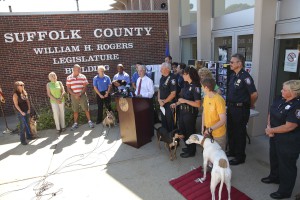
“Matti,” one of five abused dogs rescued from McDonough’s house of horrors by Suffolk SPCA, takes a much-needed nap at Second Chance Wildlife Rescue in Farmingville. (Courtesy of Michelle Curtin)
A pet goat is discovered strangled in Kings Park, with someone’s belt still strapped tightly around its lifeless body. Another is found decapitated in Islip. A cat is lynched in Patchogue. An Islip Terrace man films women crushing small animals. Somebody tortures then sets afire a dog in Brentwood.
These gruesome scenes are just a few of the 2,000 animal abuse and neglect cases handled annually by the Suffolk County Society for the Prevention of Cruelty to Animals (SPCA), a nonprofit providing humane needs and enforcement of cruelty to animal laws throughout the county. Most recently, the organization broke up what has been described as “a concentration camp” for animals at a house in Selden.
But the downturned economy has been taking its toll on Suffolk’s animal protectors. According to Suffolk SPCA Chief Roy Gross, the recession has bitten a hefty chunk out of supporters’ wallets, and consequently, donations are down about 50 percent since the downswing began. The Suffolk SPCA, he stresses, is funded completely by donations and not assoiated with the American SPCA. And in addition to its regular yearly caseload, Gross explains, his officers are weathering a roughly 20 percent spike in instances of foreclosed homeowners leaving their pets behind to die. That’s on top of a national and countywide increase in dogfighting and cockfighting cases, he adds.
Gross describes the SPCA’s situation as “critical”: “We’re running out of money,” he tells the Press. “If it keeps on going like it is, the SPCA can down the road go bankrupt.”
The Suffolk SPCA investigates all reports of animal abuse, explains Gross. The organization provides everything from law enforcement to vaccination and spay-neuter clinics to pet-friendly shelters and education classes at schools. It has a staff of about 60—mostly volunteers—including about 25 sworn peace officers who work closely with the Suffolk County Police Department and District Attorney’s Office and possess police powers to investigate and make arrests.
And its these unique powers that separate the SPCA from other animal rescue groups and make its existence so crucial, says Michelle Curtin, co-founder and director of Farmingville-based nonprofit Second Chance Wildlife Rescue.
“It’s extremely important because they’re the legal entity that can pursue a neglect or an abuse case,” explains Curtin. “All of the other rescue groups…none of us are legal entities, we don’t have legal powers.”

A child plays with several of the dogs rescued from McDonough's Selden home. The canines are undergoing rehabilitation (note the protruding ribcages of the dogs at top) at Second Chance Wildlife Rescue in Farmingville and will eventually be put up for adoption. (Courtesy of Michelle Curtin)
Second Chance is just one group Gross’ team has utilized throughout the years to house and rehabilitate rescued animals, since the SPCA currently doesn’t have its own permanent facility to do so—another opportunity the recession has jeopardized.
Suffolk County is donating its South Haven Stables in Yaphank to the SPCA for use as a rehabilitation center for abused animals, offices and to serve as a shelter and education venue. But the 20-acre facility—which could feature a collaboration with the Suffolk Sheriff’s Department whereby inmates assist in its construction and operation—will cost about $2 million to renovate, says Gross.
The SPCA’s grim recent findings in Selden also highlight the group’s significance. According to Gross, there was nothing overtly out-of-the-ordinary when his officers initially entered the home of 43-year-old Sharon McDonough to investigate a complaint made by her oldest son, Douglas, earlier this month. Nothing irregular, that is—until he led them to a small upstairs bedroom. There, Gross says, officers discovered five dogs in various states of malnutrition and abuse.
“They were jammed into small cages,” he explains. “They were in their own feces and urine. They were all matted, just bones for the most part, no food, no water.”
The rescued animals—which include one cat—are currently undergoing rehabilitation at Second Chance and will eventually be available for adoption.

Abused dogs rescued by the Suffolk SPCA from McDonough's home frolic among friends while undergoing rehab at Second Chance Wildlife Rescue in Farmingville. (Courtesy of Michelle Curtin)
As gruesome as the findings were, however, it’s what his team, members of the Selden Fire Department and Suffolk County police Emergency Services Section discovered in the mother of seven’s backyard that will forever ingrain the case into Gross’ mind and solidify the experience as “like being in a horror movie.”
Digging late into the night, the team unearthed the mutilated remains of 20 dogs. Necropsies will confirm whether the animals were tortured prior to being dumped into their graves—as McDonough’s son alleges. She’s currently charged with six counts of misdemeanor animal cruelty. The postmortem examinations will also determine whether more charges—such as felony larceny if the slain animals turn out to be neighbors’ missing pets—are coming her way, a possibility Gross describes as “most likely.”
McDonough’s son told investigators he could remember as many as 100 animals that met similar fates at the house throughout the years, says Gross, stressing the added importance his job has in society:
“Most people that hurt animals hurt people,” he explains. “Almost every serial killer in American history has began by torturing animals.”
To learn more about the Suffolk SPCA, make a donation or report animal cruelty, go to http://www.suffolkspca.org/ or call 631-382-SPCA (7722).




